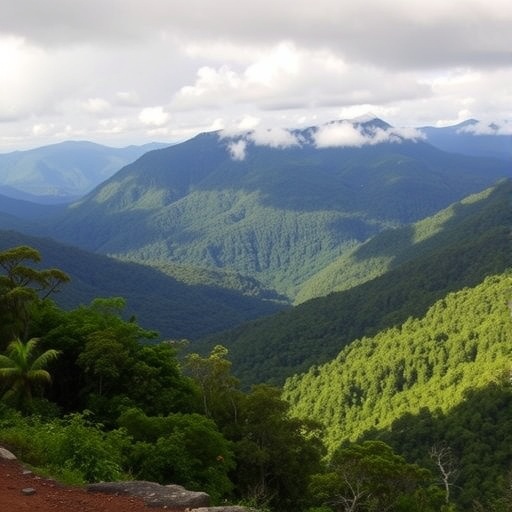Deforestation poses a profound and multifaceted threat to global ecosystems, particularly in biodiverse regions such as the African montane forests. In recent research conducted by Abera et al., the critical role of these forests in regulating local microclimates has been illuminated, revealing that significant tree loss disrupts their unique ability to buffer environmental changes. The study, published in Commun Earth Environ, emphasizes the urgent need for conservation efforts to protect these vital ecological zones.
As montane forests rise from the valley floor to alpine tundra, they create a gradient of habitats that sustain countless species, some of which are endemic to these environments. The intricate canopy layers provide essential services, including temperature regulation, increased humidity levels, and reduced wind speeds—factors that contribute to maintaining the local climate. Abera and colleagues argue that the removal of trees can destabilize these climatic conditions, which serve as a natural buffer against the impacts of climate change.
The research highlights how deforestation not only contributes to the reduction of tree cover but also accelerates the vulnerability of these ecosystems to climatic extremes. Forests function as living entities, capable of moderating temperature fluctuations by trapping heat during the day and releasing moisture at night. This biological process is critical for local flora and fauna that depend on specific temperature and moisture levels for survival. The loss of such buffering capacity may lead to increased heat stress on these ecosystems, threatening plant and animal life alike.
The implications of climate buffering extend beyond just affected wildlife. Communities that rely on these forests for agriculture, as well as traditional hunting and gathering practices, could face dire consequences as microclimatic conditions shift. Farmers may find that crop yields decrease due to erratic weather patterns, shrinking their livelihoods and challenging food security in the region. The delicate balance that these forests maintain plays an integral role in the cultural and economic fabric of the surrounding communities.
Abera et al. employed advanced modeling techniques and field data to analyze the impacts of deforestation on microclimate stability within selected montane regions. Their findings reveal a stark correlation between deforested areas and significant shifts in temperature and humidity that could have cascading effects on the ecosystem. Trees not only provide shade but also facilitate processes that maintain soil moisture through interception of rainfall. As the study notes, the reduction of tree cover leads to increased soil erosion and degradation, further amplifying these microclimatic variations.
Moreover, the researchers examined different deforestation scenarios, assessing the threshold beyond which the microclimate becomes irreversibly altered. Strikingly, they found that even moderate levels of deforestation could have concerning repercussions. As tree canopy cover diminishes, ecosystems lose resilience, making them less capable of responding to climatic shocks. This transformation can set off a chain reaction, causing habitat loss for many species, heightened competition for dwindling resources, and eventual biodiversity decline.
The research takes on an urgent tone as it discusses the potential for restoration efforts to mitigate these impacts. Abera et al. propose that reforestation and afforestation initiatives could play a pivotal role in regenerating microclimate buffering capabilities. By strategically planting native species that are well-adapted to montane conditions, it may be possible to restore the forest’s ability to regulate temperature and humidity, thereby reinforcing its role as a buffer against climate change.
In light of their findings, the study calls for an integrated approach to conservation—one that acknowledges the interconnectedness of ecosystems and human well-being. Policymakers and environmental organizations are urged to prioritize sustainable land management practices that recognize the vital role of forests in climate regulation. Public awareness campaigns can mobilize support for conservation initiatives, encouraging communities to engage in restoration projects that enhance ecological resilience.
Another critical aspect of Abera and colleagues’ work is the synergy between scientific research and indigenous knowledge. Engaging with local communities who have lived in harmony with these forests for generations can provide invaluable insights into sustainable practices that nurture both the environment and traditional livelihoods. This collaborative approach could offer a holistic solution that aligns conservation with economic development.
Aside from the environmental and social implications, the research underscores the significant role of policy frameworks in addressing deforestation. Governments must implement stronger regulations to curb illegal logging and land conversion for agriculture. Furthermore, international bodies must advocate for climate change mitigation strategies that encompass forest conservation as a key element in reducing carbon emissions globally. The story of the African montane forests is emblematic of the broader challenges faced by ecosystems worldwide.
With ongoing threats from human activity, such as land degradation and climate shifts, the urgency of the situation cannot be overstated. Abera et al.’s findings are a clarion call for immediate action and lend scientific support to advocacy efforts aimed at preserving these critical habitats. The preservation of the African montane forests is not merely an environmental issue; it is a concern for humanity as a whole.
In conclusion, the research by Abera and colleagues paints a vivid picture of the intricate relationship between forests and the microclimates they sustain. As the struggle against climate change intensifies, the fate of these ecosystems hangs in the balance. By raising awareness about the consequences of deforestation and championing conservation efforts, we can work together to safeguard the future of the African montane forests. The time to act is now—before these vital ecosystems slip away, taking with them the climate stability and biodiversity they provide.
Subject of Research: The impact of deforestation on microclimate buffering in African montane forests.
Article Title: Deforestation reduces microclimate buffering of African montane forests.
Article References:
Abera, T.A., Maeda, E.E., Heiskanen, J. et al. Deforestation reduces microclimate buffering of African montane forests. Commun Earth Environ 6, 877 (2025). https://doi.org/10.1038/s43247-025-02950-6
Image Credits: AI Generated
DOI: https://doi.org/10.1038/s43247-025-02950-6
Keywords: Deforestation, Microclimate, African Montane Forests, Climate Change, Ecosystem Services, Biodiversity, Reforestation, Conservation, Sustainable Land Management.




